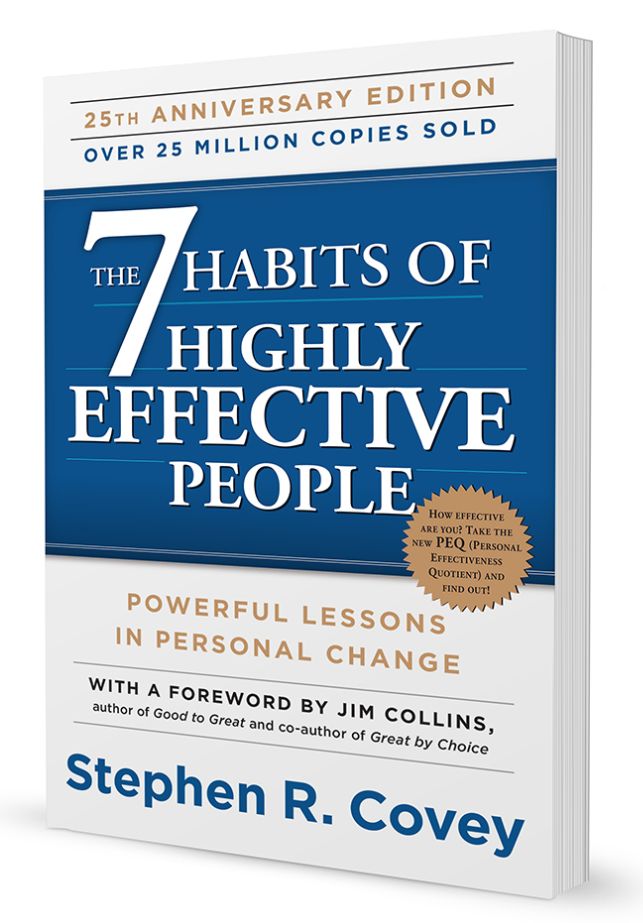这本the 7 Habits of Highly Effective People 我读的是25周年纪念版。
引子——说实话,我读个人管理时间管理的书不多,印象中很早很早以前在图书馆借过一本挺老的书叫《跳出时间的圈套》,副标题是“如何以较少的时间做更多的事情”,作者是谁已经不记得了。在网上也搜不到那本书,不知道是不是太老的缘故。这本小册子让我受益非浅,悟到了一点时间管理、自我习惯管理的真谛,对工作和学习有巨大的帮助。即使现在拿出当时的读书笔记,也觉得都是干货。不过由此带来的问题是我陷入另一个极端,以为一本书在手,自己掌握时间和自我管理之道,所以之后再没有读过其它关于时间习惯管理的书。就连这本好评如潮的书都没读过。
这本是25周年纪念版,有Jim Collins专为25周年作的序和2004年版Stephen自己写的序。两个人的序言写的都很棒,逻辑清晰,大概勾画出了JIM COLLINS的人物特征,给人一种榜样的力量,简直有点完美人生的感觉,家庭工作两不误,人生大赢家。同时介绍了这本书的构架和主旨。读完三篇序(还有一篇是Collins家庭序)有一种被打鸡血的感觉,要以作者为模范,好好修炼一番。
两篇序推荐好好阅读,这是我做笔记的方式,虽然写的比较难看,效率很高,看第二遍的时候可以挑重点看。
Words
1. After a few weeks, I fizzle.
fizzle这个词应该是形声词,发出微弱的嘶嘶声(或爆裂声)make a feeble hissing or spluttering sound
引申为失败,夭折,草草收场。(这个引申义我这么记,就是光有嘶嘶的声音,没有火苗,自然修不成正果,失败,夭折是必然的结果。
He fizzled after a few days going on diet.
2. My marriage has gone flat.
这个用法挺实用。婚姻变得平淡乏味。
3. The arguments went back and forth, each person sure of ,and adamant in, his or her postion.
adamant坚决的;坚定不移的;If someone is adamant about something, they are determined not to change their mind about it.
She is adamant about quitting the job.
4. quantum improvements
quantum巨变;猛增;飞跃;突飞猛进;Aquantum leaporquantum jumpin something is a very great and sudden increase in its size, amount, or quality.
Sentences
1. For every thousand hacking at the leaves of evil, there is one striking at the root.
作者引用Thoreau这句话旨在告诉我们,如果我们想实现生活质的飞跃,我们不应该去砍伐枝枝叶叶的态度和行为,而应该找到形成这些态度和形为的观念(paradigms)
2. We stopped trying to clone him in our own image or measure him against social exceptions. We stopped trying to kindly , positively manipulate him into an acceptable social mold.
有娃的爹妈建议认真多读两遍这段话。这让我想到了上月读的《无声告白》,父母不能把孩子复制成你想到的样子。
Summary
本节关键词: perception, personality ethics, character ethics, paradigm, paradigm shift
社会上的每个人都会面临这样或那样的问题,作者也不例外,他的问题是有个问题儿子。在解决儿子问题的过程中,他找到了解决问题的关键即:改变要从认知perception开始,他在作perception研究工作的时候,认清了personality ethics和 character ethics有很大区别,但是这两种成功论(personality ethics和 character ethics)是两种典型的社会观念(social paradigms)。
由此引出了本节最重要的概念: paradigm以及paradigm它的定义、作用、如何改变我们的言行,思维
1. Paradigm的定义:the way we "see" the world
The word paradigm comes from the Greek. It was originally a scientific term, and is more commonly used today to mean a model, theory, perception, assumption, or frame of reference. In the more general sense, it's the way we “see” the world -- not in terms of our visual sense of sight, but in terms of perceiving, understanding, and interpreting.
2. paradigm的作用,重要意义, paradigms是我们的态度行为的根源
Our paradigms, correct or incorrect, are the sources of our attitudes and behaviors, and ultimately our relationships with others.
3. 如何想自我改变,怎么办?
小改变:专注于我们的attitudes and behaviors.
如果想要飞跃式的改变就要从basic paradigms开始。这就是paradigm shift的力量
It becomes obvious that if we want to make relatively minor changes in our lives, we can perhaps appropriately focus on our attitudes and behaviors. But if we want to make significant, quantum change, we need to work on our basic paradigms.
4. paradigm shift是今天最重要的概念了,自我改变从观念改变开始
